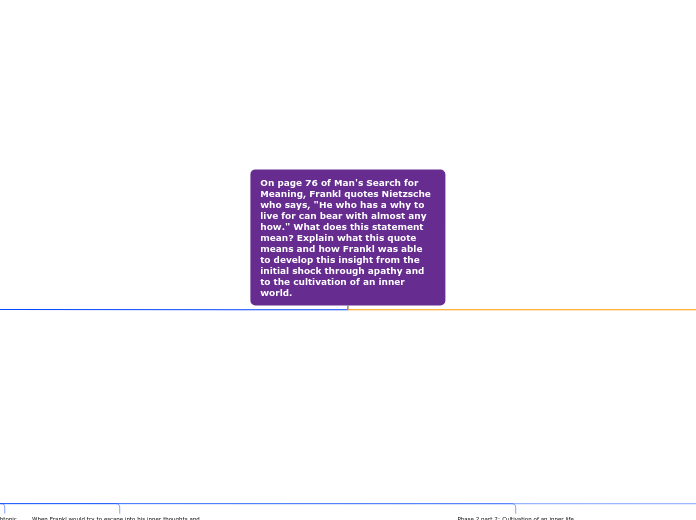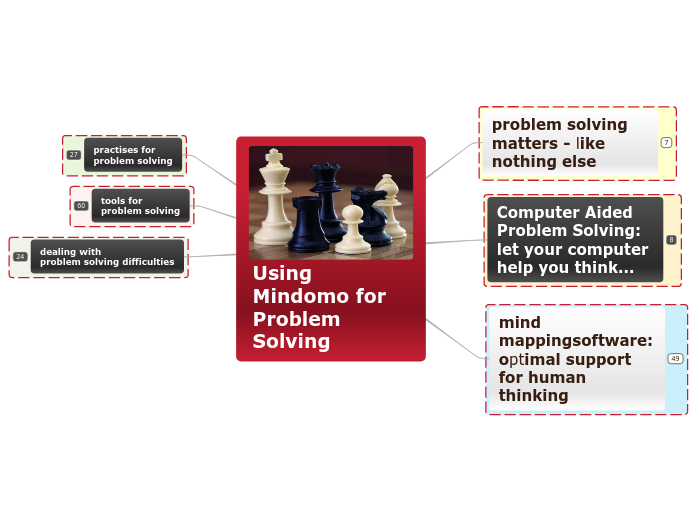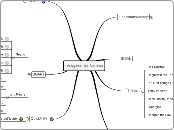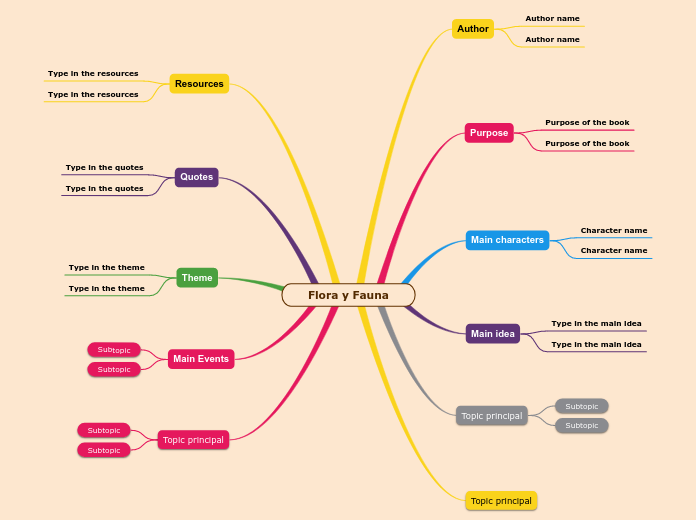On page 76 of Man's Search for Meaning, Frankl quotes Nietzsche who says, "He who has a why to live for can bear with almost any how." What does this statement mean? Explain what this quote means and how Frankl was able to develop this insight from the initial shock through apathy and to the cultivation of an inner world.
Main topic
In Frankls book " A Man's Search for Meaning" he quotes Nietzche who says " He who has a why to live for can bear with almost any how." This quote means that having a purpose for living can give us strength to overcome challenges, Frankls "why" is his love for his wife and his motivation to stay alive , there love gives him motivation to overcome anything thrown at him and he uses the strength of their love to adapt, as being in the camps he had to endure unimaginable sufferings, view such horrible things, while trying to find inner happiness. He develpoed his motivation through 3 stages, shock which was his reaction to the camp, apathy the numbness that took over and lastly his cultivation to the inner world.C
Phase 2 part 2: Cultivation of an inner life
How did Frankl start to develop his insight regarding cultivation of inner life?
MP: Frankl was discovering the meaning of life and his purpose
nature
"If there is a meaning to life at all then, there must be a meaning in suffering. Suffering is an eradicable part of life even as fate and death. Without suffering and death, human life cannot be complete." (77)
Frankl had realized what suffering had meant, and that suffering was necessary to fully embrace life, from now on Frankl and the other camp members were not going to create illusions on the camp and stop ignoring the torture from the camp but do view the suffering as opportunities for achievement.
LOVE
"Love goes very far beyond the physical person of the beloved." (38.)
Develop a "why" or purpose
"Life does not mean something vague, but something very real and concrete, just as life's tasks are very real and concrete...Sometimes man may be required simply to accept his fate and bear his cross...But when a man finds that his destiny is to suffer, he will have to accept his sufferings as a task." (77-78)
Frankl is saying that his "why" in life is to stay alive and re do his manuscript. He uses his inner thoughts as motivation that he will make it out alive of the camps and complete his goal.
When Frankl would try to escape into his inner thoughts and escape from reality to go to his happy place the only person he would think about was his wife and even though he hadn't seen her in so long and didn't even know if she was alive but the thought of her relaxed him when times were tough.
Phase 2: Part 1. Apathy
What happens in the first part of phase 2 and how do Frankl and the other prisoners respond?
Subtopic
Frankl and the other people had become numb to the pain
How do the prisoners respond?
loss of hope
"At that moment I became intensely conscious of the fact that no dream, no matter how horrible, could be as bad as the reality of the camp which surrounded us, and which I was about to recall" (52.)
Frankl saw a man having a terrible nightmare, screaming in his sleep and when he woke up he wasn't even relived to have woken up because reality was worse then his nightmare.
What are the characteristics of this phase?
0 emotion
"One by one prisoners approached the still warm body. One grabbed the remains of a messy meal of potatoes, another decided that the corpse's wooden shoes were an improvement on his own, and exchanged them." (39.)
suicidal thoughts
"There was nothing more to expect of life"
He found his child in a foregin country
Phase 1: Shock (pp 8-20)
What was the first phase of camp life and how did Frankl (and the other prisoners respond?
Shock, as the prisoners were in the train they were all very anxious when they saw Auschwitz "The very name that stood for all that was horrible." There Identities were taken, they were given a number and there number was there new name. They were shaved until there was nothing left to shave on there body, they were sleeping in 6-8 foot beds with 9 other people in it, they would use their shoes for pillows.
How did Frankl respond?
Subtopic
“Somewhere it is said that man cannot exist without sleep for more then a stated number of hours.Quite wrong! (17)
Cold Curiosity
What were the characteristics of this phase?
Sleeping in 6-8 foot beds with 2 blankets with 9 men
"On each tier (measuring six and a half to 8 feet) slept nine men, directly on the boards. Two blankets were shared by each nine men.
The sleeping conditions were terrible, if you were a light sleeper you now sleep with 8 other people 1 foot away from you.
Identities Taken
“All we possessed, literally was our naked existence.”
(15)
Anything that remained from their former life was traded for goods. “For me there were my glasses and my belt; the latter I had to exchange later on for a piece of bread.
(15)
explanation









